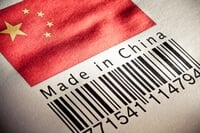China-Free Dog Food? Don’t Count On It
DogFoodAdvisor is reader supported See how
Dog Food Advisor is 100% impartial and is never paid to promote any brand. But if you buy using links on this page, we may earn a referral fee.
These days, I keep reading around the Internet about how this or that dog food is completely free of Chinese ingredients.
 And frankly, I’m puzzled.
And frankly, I’m puzzled.
After all, there are so many basic pet food ingredients that today are no longer even made here in North America.
Take vitamin C, for example. In just a little over a decade, Chinese manufacturers have cornered over 90% of the U.S. market for this common vitamin.1
And it’s not just the vitamin C market that’s been affected. It’s the rest of the nutraceutical and pharmaceutical industries, too.
According to a recent post in the Seattle Times, China now makes…
- 70 percent of the world’s penicillin
- 50 percent of the earth’s aspirin
- 35 percent of its acetaminophen (generic Tylenol)
- The bulk of the world’s vitamins A, B12, C and E
The Problem with Chinese Ingredients
Today, it’s nearly impossible to find a U.S. manufacturer for some essential vitamin and mineral supplements. So, even if a pet food company insists on using 100% domestic ingredients, that noble goal can be elusive.
Now, don’t get me wrong. I’m not saying Chinese ingredients are automatically inferior to our own.
But let’s face it, in spite of continued promises for reform by the Chinese government, the country’s ongoing saga of food safety scandals persists unabated.
Yet most consumers still believe there’s a law protecting them from pet foods containing foreign-made ingredients?
The Shocking Truth About
Country of Origin Labeling Laws
Here in the U.S., current country of origin labeling laws are either weak or non-existent. They offer little protection to consumers, especially when it comes to the source of a dog food’s ingredients.
For a product to be labeled “Made in the USA” (or for that matter, any other country), regulations require only that the product be “all or virtually all” made in that country.
Nowhere do labeling rules mandate the identification of sources of the individual components that were used to make a product.
So, even though a company reports they manufacture a dog food completely in a U.S. or Canadian facility, there’s no way to assure a consumer the ingredients weren’t sourced from a foreign producer.
Why China-Free Today Can’t Guarantee
It’ll Be China-Free Tomorrow
And there’s no requirement to inform consumers of a change of any ingredient’s country of origin either.
So, a recipe claim made today is never a guarantee the same will be true tomorrow.
Even though a manufacturer or a well-meaning third-party writer may report a dog food company’s products are “100% China Free” or “Made in the USA”, there’s nothing to legally guarantee the next batch of raw materials can’t come from a different source.
And that’s precisely the reason The Dog Food Advisor relies solely on government-regulated pet food labels and intentionally ignores virtually everything else.
It would be misleading to our readers for us to do otherwise.
The Bottom Line
Isn’t it possible your dog’s food is different? That it’s 100% free of Chinese ingredients?
Of course, it’s possible — but not likely.
Think about it.
If human supplements are mostly sourced from China, what are the chances any profit-conscious pet food company will now be able to acquire the few still made in North America?
And what’s the likelihood that same company would be willing to pay the competitive prices required to get them?
Sure, anything’s possible.
After all, even a broken clock is right twice a day.
Final word
The Dog Food Advisor does not accept money, gifts, samples or other incentives in exchange for special consideration in preparing our reviews.
However, we do receive a referral fee from online retailers (like Chewy or Amazon) and from sellers of perishable pet food when readers click over to their websites from ours. This helps cover the cost of operation of our free blog. Thanks for your support.
For more information, please visit our Disclaimer and Disclosure page.




